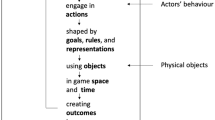Abstract
In striving to establish a theoretical framework for the academic study of games it is crucial that we, as game researchers, consider carefully the core concepts that pervade our work. Certain metaphors provide the very foundations upon which future research is to be built. If we are to move forward, we have to, as is the case with any develo** field of study, take certain concepts as given. These are the tools of our trade. They allow us to progress without having to constantly try to re-invent the proverbial wheel. A great deal of work has recently gone into defining our object of study. Efforts at synthesising and refining previous game definitions undertaken by Juul (2005) and Salen and Zimmerman (2003) have been of great use in this respect. But the conceptual awareness I am advocating here delves deeper than definitions. It strikes at the assumptions that these definitions and other basic concepts that underlie our thinking about games take as given.
Access this chapter
Tax calculation will be finalised at checkout
Purchases are for personal use only
Similar content being viewed by others
Notes
- 1.
For a more detailed discussion of the phenomenon of incorporation see In-Game: From Immersion to Incorporation available from MIT Press as of Spring 2011.
References
Anchor, R. 1978. History and play: Johan Huizinga and his critics. History and Theory 17(1): 63–93.
Blizzard Entertainment. 2004. World of warcraft. PC: Vivendi Universal.
Bryce, J., and J. Rutter. 2006. Understanding digital games. London: Sage.
Caillois, R. 1962. Man, play and games. London: Thames and Hudson.
Calleja, G. 2007. Digital games as designed experience: Reframing the concept of immersion. Unpublished doctoral thesis, Victoria University of Wellington, Wellington.
Castronova, E. 2005. Synthetic worlds: The business and culture of online games. Chicago: University of Chicago Press.
Copier, M. 2007. Beyond the magic circle: A network perspective on role-play in online games. Unpublished doctoral, Utrecht University.
Crawford, G. 2009. Forget the magic circle (or towards a sociology of games). Paper presented at the Under the Mask 2. University of Bedfordshire.
Dibbell, J. 2006. Play money: Or, how I quit my day job and made millions trading virtual loot. New York: Basic.
Digital Illusions CE. 2002. Battlefield 1942. PC: Digital Illusions CE.
Dovey, J., and H.W. Kennedy. 2006. Game cultures: Computer games as new media. Berkshire: Open University Press.
EA Sports. 2008. FIFA 2009. XBOX 360: EA Sports.
Ehrmann, J. 1968. Homo Ludens revisited. Yale French Studies 41: 31–57.
Fink, E. 1968. The oasis of happiness: Toward an ontology of play. Yale French Studies 41: 19–30.
Goffman, E. 1986. Frame analysis: An essay on the organization of experience. Boston: Northeastern University Press.
Huizinga, J. 1954. The waning of the middle ages; a study of the forms of life, thought, and art in France and the Netherlands in the XIVth and XVth centuries. New York: Doubleday: Anchor.
Huizinga, J. 1955. Homo ludens; A study of the play-element in culture. Boston: Beacon.
Huizinga, J., and J.H. Huizinga. 1936. In the shadow of tomorrow. New York: W. W. Norton & Company.
Juul, J. 2005. Half-real: Video games between real rules and fictional worlds. Cambridge, MA: MIT Press.
Juul, J. 2008. The magic circle and the puzzle piece. Paper presented at the Philosophy of Computer Games 2008, Potsdam.
Lakoff, G., and M. Johnson. 2003. Metaphors we live by. Chicago: University of Chicago.
Lammes, S. 2006. Spatial regimes of the digital playground. Paper presented at the Gaming Realities: A Challenge for Digital Culture, Athens.
Liebe, M. 2008. There is no magic circle. Paper presented at the Philosophy of Computer Games 2008, Potsdam University, Germany.
Linden Lab. 2003. Second life. PC: Linden Lab.
Malaby, T. 2007. Beyond play: A new approach to games. Games and Culture 2(2): 95–113.
MindArk. 2003. Project Entropia. PC: MindArk.
Murray, J.H. 1998. Hamlet on the holodeck: The future of narrative in cyberspace. Cambridge, MA: MIT Press.
Northrup, C. 2004. The qualities of a Tolkienian fairy story. Modern Fictional Studies 50(4).
Origin Systems. 1997. Ultima Online. PC: Electronic Arts.
Pargman, D., and P. Jakobsson. 2006. The magic is gone: A critical analysis of the gaming situation. Paper presented at the Gaming Realities: A Challenge for Digital Culture, Athens.
Salen, K., and E. Zimmerman. 2003. Rules of play: Game design fundamentals. Cambridge, MA: MIT Press.
Suits, B.H. 1978. The grasshopper: Games, life, and Utopia. Toronto/Buffalo: University of Toronto Press.
Taylor, T.L. 2006. Play between worlds: Exploring online game culture. Cambridge, MA/London: MIT Press.
Walsh, R. 2007. The rhetoric of fictionality: Narrative theory and the idea of fiction. Columbus: Ohio State University Press.
Yee, N. 2006. The labour of fun. Games and Culture 1(1): 68–71.
Author information
Authors and Affiliations
Corresponding author
Editor information
Editors and Affiliations
Rights and permissions
Copyright information
© 2012 Springer Netherlands
About this chapter
Cite this chapter
Calleja, G. (2012). Erasing the Magic Circle. In: Sageng, J., Fossheim, H., Mandt Larsen, T. (eds) The Philosophy of Computer Games. Philosophy of Engineering and Technology, vol 7. Springer, Dordrecht. https://doi.org/10.1007/978-94-007-4249-9_6
Download citation
DOI: https://doi.org/10.1007/978-94-007-4249-9_6
Published:
Publisher Name: Springer, Dordrecht
Print ISBN: 978-94-007-4248-2
Online ISBN: 978-94-007-4249-9
eBook Packages: Humanities, Social Sciences and LawPhilosophy and Religion (R0)




